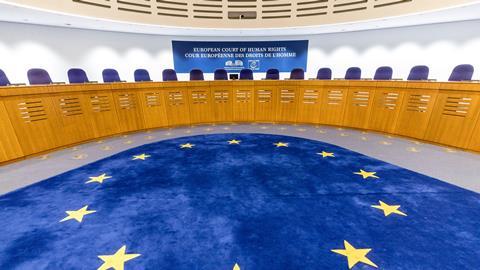To its detractors, the European Convention on Human Rights and its court stand in the way of the UK achieving its post-Brexit potential. A new government has eased tensions, but as Catherine Baksi reports, the pan-European march of the far-right poses a new existential threat
The low down
Calls to quit the European Convention on Human Rights grew louder when the ultimate arbiter of those rights, the European Court of Human Rights, prevented the deportation of asylum seekers to Rwanda. Hundreds of millions of pounds had been poured into the Rwanda scheme, which saw only a handful of voluntary departures for the African nation. The UK now has a new government, apparently stabilising the relationship with convention and court. Supportive lawyers point out that the UK’s own systems designed to protect rights – notably the Human Rights Act 1998 – mean that in reality, the country has come into conflict with the court on remarkably few occasions. But perhaps such political tensions have been exported. Across parts of Europe, the influence and electoral success of right-wing ethno-populists is on the rise, fuelled by anti-immigration sentiment. Can the court safely navigate such tensions?
Drafted in the aftermath of the second world war, the conflict’s horrors fresh in the mind, the European Convention on Human Rights (European Convention) was an attempt to ensure that there would be no repeat of the atrocities committed, and that the fundamental rights eroded during Europe’s path to war would henceforth be safeguarded. The UK played an important role. Winston Churchill was an early advocate.
Signed by the UK’s Labour government in 1951, the European Convention protects citizens from torture, killing and slavery, and assures freedom of speech, assembly, religion and privacy. A new court, the European Court of Human Rights (European Court), was created to protect those rights when national courts failed to do so.
Immigration
In reviewing Europe’s current political landscape, observers are not looking to the idealism of the post-war 1950s for comparison. Instead, they reference the 1930s and the rise in nationalism.
Immigration has been a flashpoint in the relationship between the UK and the European Court. The Conservative government’s plans to send all asylum seekers ‘illegally’ entering the UK after 1 January 2022 to Rwanda for their claims to be assessed threatened a crisis.
Focused on stopping the arrival of small boats to British shores, the rhetoric from some Conservative MPs became increasingly hostile to the Strasbourg institution, even though UK courts had also frustrated deportations. There were calls for the UK to quit the European Convention and thereby the jurisdiction of the European Court.
This stance was becoming mainstream on the government benches before July’s general election. Encouraged by the right wing of his party, prime minister Rishi Sunak indicated that withdrawal from the European Convention could occur if the UK’s membership frustrated his policy on illegal immigration or endangered ‘national security’.
This threat followed an ‘interim measure’ from the European Court in June 2022 which prevented the first flight carrying asylum seekers from being sent to Rwanda until the UK courts had considered the issue.
Such measures are ‘urgent orders’. Similar to an injunction, they are made in ‘exceptional circumstances’ where there is an ‘imminent risk of irreparable harm’. They are typically requested where a person faces a threat to life or a risk of torture or inhuman or degrading treatment.
'I am confident that the relationship between the UK and the convention system will be more balanced in the months and years to come'
Robert Spano, Gibson Dunn
The following November, the UK Supreme Court ruled that the Rwanda policy was unlawful, precipitating what was dubbed ‘Alice in Wonderland’ legislation, which stated that the east-central African country was a safe country for asylum seekers.
The election of Sir Keir Starmer’s Labour party was, therefore, a relief for the court’s supporters. As a barrister, in 1999 Starmer literally wrote the book on the Human Rights Act 1998 and the European Convention. Among his first actions as prime minister was to scrap the Rwanda legislation and affirm the UK’s commitment to remain a member of the European Convention.
Robert Spano, president of the court from 2020 to 2022 and now a partner at international law firm Gibson Dunn, says: ‘Considering the Labour government’s and the prime minister’s public statements on the ECHR, I am confident that the relationship between the UK and the convention system will be more balanced in the months and years to come.’

This ‘welcome development’, he says, ‘signals that political priorities in the UK will become more aligned with the positive status of the relationship between the European Court of Human Rights and the UK courts’.
In the context of a deteriorating global landscape for the protection of human rights, Spano is pleased that the Labour government has ‘clearly and unequivocally signalled its adherence to the rule of law and international human rights’.
Veteran human rights barrister Geoffrey Robertson suggests that the court is now ‘safe from silly Tory MPs who are not lawyers demanding that we withdraw’. He adds that the institution has been ‘very helpful in developing English law in a just direction, deferential to human rights’.
But Colm O’Cinneide, a professor of human rights law at University College London, is more cautious. While the ‘crisis’ has ‘dissipated for now’, he suggests that the political debate will continue, adding that ‘it will be interesting to see the next Conservative party manifesto’.
'We will review every policy, treaty and part of our legal framework – including the ECHR and the Human Rights Act'
Kemi Badenoch, Conservative party leader
During the recent Tory leadership tussle, losing candidate Robert Jenrick pushed for the UK’s departure from the European Convention, telling activists that the party would ‘die’ otherwise. He argued that the convention had made it ‘impossible to secure our borders’.
His victorious rival, Kemi Badenoch, was less enthusiastic about leaving. However, ahead of the publication of the latest migration figures – which showed that net migration to the UK fell by 20% last year from a record 906,000 the year before – Badenoch indicated that she was willing to change her position. Arguing for a ‘new approach’ to immigration, she suggested that the UK’s membership of the treaty is on the table.
‘We have to get the diagnosis right,’ Badenoch said. ‘So we will review every policy, treaty and part of our legal framework – including the ECHR and the Human Rights Act.’
While there is ‘no immediate threat on the horizon’, O’Cinneide notes that political developments across Europe, with the political right growing in power and a focus on immigration, could spark further long-term instability.
However, he stresses that the court and convention have not attracted the ‘same level of hostility’ in other European Union countries as in the UK. ‘Many governments see [them] as an important part of the EU ecosystem,’ he adds. Some, notably Ireland, are ‘strongly supportive’.
Ghost in the machine
Are rights sufficiently human in the age of the machine? That was the question posed by master of the rolls Sir Geoffrey Vos in a recent lecture at Pembroke College, Oxford.
He called on national and international lawmakers to ‘rethink’ fundamental human rights for the first time since the end of the second world war, in light of the rise of artificial intelligence. Vos suggests that as the ability of machines and AI to make decisions grows, the ‘current international legal order, as it affects the rights of humans’, may no longer be fit for purpose.
Predicting a time when AI is so good that human decision-makers may be left with no choice but to accept the solution proposed by machines, Vos warned: ‘We need to be careful to ensure that we do not sleep-walk into usages of extremely capable AI that change what humans do and how they do it for good, without our having even embarked on a debate about the fundamental rights of those humans.’
The Council of Europe Framework Convention on Artificial Intelligence and Human Rights, Democracy and the Rule of Law was adopted in Vilnius in September. It provides that states shall adopt measures ‘to ensure that the activities within the lifecycle of artificial intelligence systems are consistent with obligations to protect human rights, as enshrined in applicable international law and domestic law’.
However, the master of the rolls pointed out that this does not extend the rights of humans in relation to automated decision-making. And existing domestic, EU or international regulations are ‘probably not competent to prevent AI being used inappropriately to make decisions that ought, for the benefit of humanity, to be taken by humans’.
Vos mooted the creation of a ‘fundamental right to have material human consideration of decisions requiring empathy or emotional intelligence’. This, he added, prompts the question of which decisions require human empathy.
The MoR also mooted a more far-reaching rule along the lines of article 22 of the GDPR’s right not to be subject to a decision ‘based solely on automated processing, which produces legal effects’.
In finding the answers, Vos stressed the need ‘not to make perfect solutions into the enemies of good solutions’.
Co-dependency
Raja Rajeswaran Uruthiravinayagan, a solicitor at Duncan Lewis, emphasises the broader relevance of the European Convention to UK politics. It underpins critical agreements and frameworks, including the Good Friday Agreement. ‘The ECHR is a condition of the UK-EU Trade and Cooperation Agreement,’ he notes, stating that withdrawal could disrupt judicial cooperation, including extraditions. Withdrawal could also see cooperation on security matters suspended by the EU.
In addition, he points out that the Human Rights Act underpins devolved powers in Scotland, Wales and Northern Ireland. Any changes to it, or the introduction of a UK Bill of Rights, would require adjustments to those frameworks.
Criticisms of the court by some politicians and sections of the media, insists Leigh Day solicitor Andrew Lord, ‘have been overblown’. Most people, he argues, would agree that the types of rights protected by the European Convention ought to remain protected and that the government ought to be held to account if they fail to protect them.
Most importantly perhaps, the existence of the European Court does not undermine the sovereignty of the national parliament or Supreme Court as the final arbiter in the UK.
As Lord explains, section 2 of the Human Rights Act only requires courts in the UK to ‘take into account’ any relevant Strasbourg case law.
Defining the nature of that obligation in the 2004 case of Ullah, Lord Bingham said: ‘The duty of national courts is to keep pace with the Strasbourg jurisprudence as it evolves over time: no more, but certainly no less.’ It has been argued that this creates a presumption that in interpreting and applying European Convention rights, UK courts will look at the European Court case law as their primary guide.
In fact, in subsequent cases UK courts have shown a greater willingness to depart from Strasbourg, says Lord. He points to Kay v Lambeth LBC, where the House of Lords reaffirmed the domestic doctrine of precedent, by which courts are bound, notwithstanding any inconsistency with European case law.
Subsequently, he adds, in Manchester City Council v Pinnock, it was restated that the ‘Supreme Court was not bound to apply every ECtHR decision’.
While Strasbourg case law may ‘guide or influence’ domestic courts, Lord continues, it is for the latter – and especially the Supreme Court – to decide whether it ‘will follow particular Strasbourg jurisprudence’. The Supreme Court has ‘shown its willingness to depart from it, where it considers this to be necessary’.
Under Article 46 of the European Convention, member states must comply with European Court judgments, but, as Uruthiravinayagan says, they retain discretion on implementation. ‘In the UK, parliamentary sovereignty means domestic laws are not automatically amended following a European Court ruling. Instead, parliament decides how to address issues identified by the court,’ he adds.
Through declarations of incompatibility, influential judgments and judicial guidance, Uruthiravinayagan argues that the European Court has, however, significantly shaped UK law, influencing legislation, judicial practices and administrative policies.
In particular, notes O’Cinneide, the liberalisation of defamation law in the UK has been driven in part by Strasbourg, as has the development of much criminal procedure, mental health law, detention and procedural rights, housing law and the rights of tenants.

Overall, stresses Law Society president Richard Atkinson: ‘The UK has an excellent record of compliance with the ECHR and is one of the states with the lowest number of cases decided against it by the ECtHR.’
Of 563 judgments involving the UK, more than half have found at least one violation, indicating areas where UK practices fall short of European Convention standards, says Uruthiravinayagan. But most of those occurred between 1951 and 2000. Since the Human Rights Act 1998 came into force in 2000, there has been a downward trend in the number of European Court judgments finding violations by the UK.
Between 2001 and 2011, the average number of violations per year was 18, while between 2011 and 2023 it was just four.
‘In 2023, only three cases against the UK proceeded to final judgment, and of these, the UK only lost one,’ says Atkinson. This, he argues, ‘demonstrates that there is generally a high level of respect for human rights in the UK’ and shows that the system of human rights protections, with the Human Rights Act at its core, is working well.
The European Court, affirms Spano, ‘has viewed the UK system in very favourable terms for many years due to the high quality of domestic jurisprudence in this field based on the Human Rights Act’.
Successive European Court presidents, says O’Cinneide, made clear that its role is ‘not to micromanage, but to have a watching brief to protect core rights and work with national governments and courts to ensure proper rights protection’. Where national authorities, including courts, ‘have made a good stab at protecting rights’, the European Court is ‘reluctant to intervene’.
The first judgment against the UK was in 1975 and concerned the right of a prisoner to access a lawyer as part of the right to a fair trial.
Since then, rulings have led to changes in UK law and policy, including the abolition of corporal punishment in state schools, removing the ban on gay people serving in the military, decriminalisation of homosexuality in Northern Ireland, reforms of the blanket ban on prisoner voting, and the domestic violence exemption from the bedroom tax.

Following other Strasbourg rulings, the UK now allows legal aid to be granted in defamation cases in exceptional circumstances. The UK also introduced legal safeguards for the placement and detention in psychiatric facilities of vulnerable people who cannot make legal decisions for themselves.
In addition, says O’Cinneide, the European Court is open to dialogue in how it engages in discussion with national courts and deals with legitimate criticism from national governments. ‘Where member states raise concerns about practices of the ECtHR, it has shown itself to be sensitive and willing to introduce changes to address the issues,’ agrees Atkinson.
For example, changes were made to the text of the European Convention to emphasise that national authorities have the primary role of protecting rights and that the European Court should only step in when national authorities fail in this regard. In March 2024, the European Court made a series of reforms to its interim measures following criticism of their use, including from the UK.
Pending cases before the European Court encompass a legal loophole that means thousands of women who were sexually abused as children cannot get justice in the UK; and the UK government’s failure to call an independent investigation into Russian interference in UK democratic processes. Leigh Day is acting in both.
Some predict that a challenge to the Labour government’s introduction of VAT on private school fees may also end up before the court.
If such a VAT case does go to Strasbourg for determination, the scenario would perfectly reflect the UK’s complex political relationship with the European Court and the European Convention – certainly insofar as the Conservative opposition is concerned. Such a case would see politicians who oppose continued UK membership of the European Convention pinning their hopes on an appeal to its European Court to protect rights that they value, and which, they argue, are threatened by the policy of the sovereign national government.
Catherine Baksi is a freelance journalist
































No comments yet